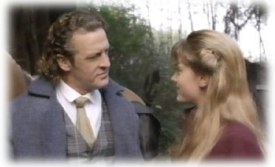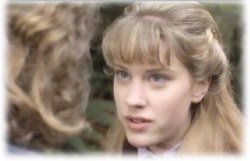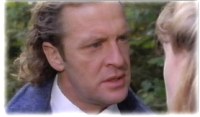 Recently I was asked by a friend just why I had my fan site
NeilandChristy.com and just what was so fascinating about this couple.
They emailed me something to the effect of what is the big deal about
MacNeill and Christy and what on earth did I get out of this. In the
process of answering my friend, (an old friend from my literary studies
days at UWF), I discovered something that I would like to share with
other MacNeill and Christy fans and see if they agree. Recently I was asked by a friend just why I had my fan site
NeilandChristy.com and just what was so fascinating about this couple.
They emailed me something to the effect of what is the big deal about
MacNeill and Christy and what on earth did I get out of this. In the
process of answering my friend, (an old friend from my literary studies
days at UWF), I discovered something that I would like to share with
other MacNeill and Christy fans and see if they agree.
This explanation requires an understanding of irony, so first I will
attempt background explanations on the concept and then go forward. (For
those of you who know this drill, my apologies. This part is for those
who may not.) Irony in literature and in film involves the concept of
the reader/audience having knowledge of something that is being
subverted or hidden by what is being read, shown or heard. Simply put,
it is saying or showing one thing and meaning another. There are several
different types of irony; here are a few that come into play in Christy.
- Verbal irony is when a character speaks and says something where
their implicit meaning differs greatly from the meaning that is
expressed. For example, this is at play big time in RTCG when Christy
tells Harriet Quimby that she and Doctor MacNeill are nothing more than
friends. We know better and so does Christy and as it turns out so does
Harriet.
- Dramatic irony is when the audience knows something about a situation
of which a character is ignorant that makes their actions/words
inappropriate to the actual circumstances. For example, in The Road
Home, Christy believes David Grantland is frequenting the Tea House when
we, the audience, know he has been going to El Pano to mail payments on
an engagement ring.
- Situational irony is when there is a discrepancy between the expected
results and the actual results, or simply put the difference in what we
think will occur in a situation and what actually does occur. For
example, In Return to Cutter Gap it is situational irony at play when we
notice that it is the road that the mountain families believe has
brought in the thieving outsiders, but it reality it is one of their own
(Lundy Taylor) who is also thieving. And not only that but the road that
winds along the ground isn't what stirs up the most trouble in the cove;
it is a plane that falls out of the sky that really "riles up all the
menfolk" and upsets all the women folk (including Christy.)
 What makes irony compelling to the reader/viewer is that it makes us
feel that we are in on the secret and engaged in some special way in the
story. It also involves to a large extent the subtext of the
characters-- the unspoken thoughts and motives that lie just beneath the
surface. This is what the characters really think and feel but don't
express, and makes the character have depth, complexity and motivations
not revealed just through dialog. It is at the heart of good acting and
consists of facial expressions, gestures, intonation of speech, etc.
It is what makes us watch a certain performer or character over another
one. In dramatizing irony, an actor must internalize huge parts of the
character and make him/her seem real. What makes irony compelling to the reader/viewer is that it makes us
feel that we are in on the secret and engaged in some special way in the
story. It also involves to a large extent the subtext of the
characters-- the unspoken thoughts and motives that lie just beneath the
surface. This is what the characters really think and feel but don't
express, and makes the character have depth, complexity and motivations
not revealed just through dialog. It is at the heart of good acting and
consists of facial expressions, gestures, intonation of speech, etc.
It is what makes us watch a certain performer or character over another
one. In dramatizing irony, an actor must internalize huge parts of the
character and make him/her seem real.
Now I don't know if you have ever thought about it this way before or
not but the most ubiquitous use of irony in Christy is found in
scenes/situations regarding MacNeill and Christy's relationship. And if
this surprises you, I will show you how widespread this is. It is
verbal irony when we hear Christy say that she and MacNeill are nothing
more than friends or that she has no interest in MacNeill or in pathetic
excuses like I came for a book or yadda yadda yadda. And sometimes
MacNeill is no better. (How about his Low Gap remark followed
immediately by a correction that masks his intent.) But we the audience
know better, and we also know that they each know better and sometimes
other people that they are talking to know better, such as Miss Alice in
Eye of the Storm or Fairlight in The Road Home or Christy's mom in The
Sweetest Gift.
 Likewise, it is dramatic irony that is at the heart of the problem in
Green Apples. We see Christy scheme and plan a subterfuge to get
MacNeill to change his mind about Dan Scott, and so she openly flirts
with MacNeill, and we see his eager reaction. We, the audience, know
something that they don't know...that she is there to manipulate him and
he thinks she is there for another reason. But she doesn't get why he is
so upset and he doesn't understand why she doesn't understand. It is a
great comic moment undercut by a pathos of sort. Another use of dramatic
irony is in The Road Home when we know Margaret MacNeill is at the cabin
trying to convince her husband to take her back and meanwhile Christy
has just discovered she is in love with MacNeill and hurries to his
cabin at the same moment to see him. We see this train wreck coming, but
neither MacNeill or Christy do until the cars collide. Likewise, it is dramatic irony that is at the heart of the problem in
Green Apples. We see Christy scheme and plan a subterfuge to get
MacNeill to change his mind about Dan Scott, and so she openly flirts
with MacNeill, and we see his eager reaction. We, the audience, know
something that they don't know...that she is there to manipulate him and
he thinks she is there for another reason. But she doesn't get why he is
so upset and he doesn't understand why she doesn't understand. It is a
great comic moment undercut by a pathos of sort. Another use of dramatic
irony is in The Road Home when we know Margaret MacNeill is at the cabin
trying to convince her husband to take her back and meanwhile Christy
has just discovered she is in love with MacNeill and hurries to his
cabin at the same moment to see him. We see this train wreck coming, but
neither MacNeill or Christy do until the cars collide.
It is a case of situational irony in The Road Home when we watch Christy
and the women march down to the Tea House in El Pano to cause a stink
and drag their menfolk home. We expect the fireworks between David &
Christy and Fairlight & Jeb and the other women & their husbands. But
instead the real heat comes from the discovery that Margaret MacNeill is
one of the tea house girls. This blind sides everyone, especially Miss
Alice, MacNeill, Christy, and us too. See the irony here...the ones who
have intentionally not gotten involved in the melee at the tea house but
instead have come to break it up and establish peace are the ones who
get much more than they bargained for.
In a way I believe it is through irony that we start to identify so
closely with MacNeill and Christy as we feel like co-conspirators who
are in on their little secret, and we identify with and suffer their
indignities too. Irony is extremely effective in maintaining the
tension and conflict, and this makes the story compelling. Not only
that, but MacNeill and Christy's relationship is anchored on a basic
irony--that Christy's obvious match up should be with the earnest young
minister David Grantland but instead it is the enigmatic, complex,
mature Dr. MacNeill that she finds herself inevitably drawn to. Life and
love ARE ironic; your head tells you one thing and your heart another.
And this truth is why I think so many of us find this couple so
intriguing. Not only that, but their characters are cleverly written,
laden with subtextual meaning that requires great acting to convey, and
they are surrounded by tension, conflict and an extraordinary dynamic.
They are fascinating to watch and because their intimate, special
moments together are so hard to come by and their feelings for each
other so cloaked in layers of subverted meaning, we relish every time
they come in contact. Their relationship requires us to think and
uncover the truth. And in this process we must also participate. In so
doing, we too carry away something from our time spent with them.
|